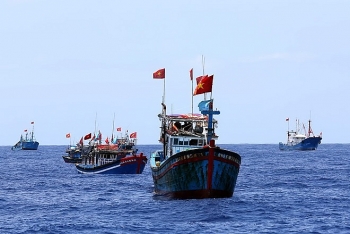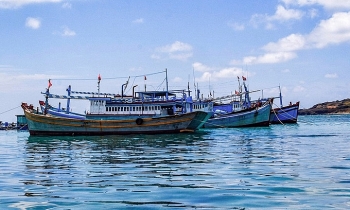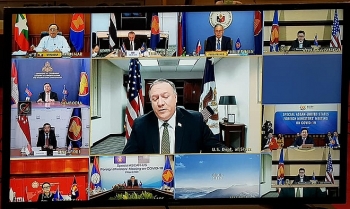U.S. Sends Warships on Patrol Near East Sea Standoff amid rising tensions
| Vietnam objects to China's recent fishing ban in East Sea | |
| China again imposes illegal fishing ban in East Sea | |
| US Secretary of State accuses China of pushing territorial ambitions during pandemic |
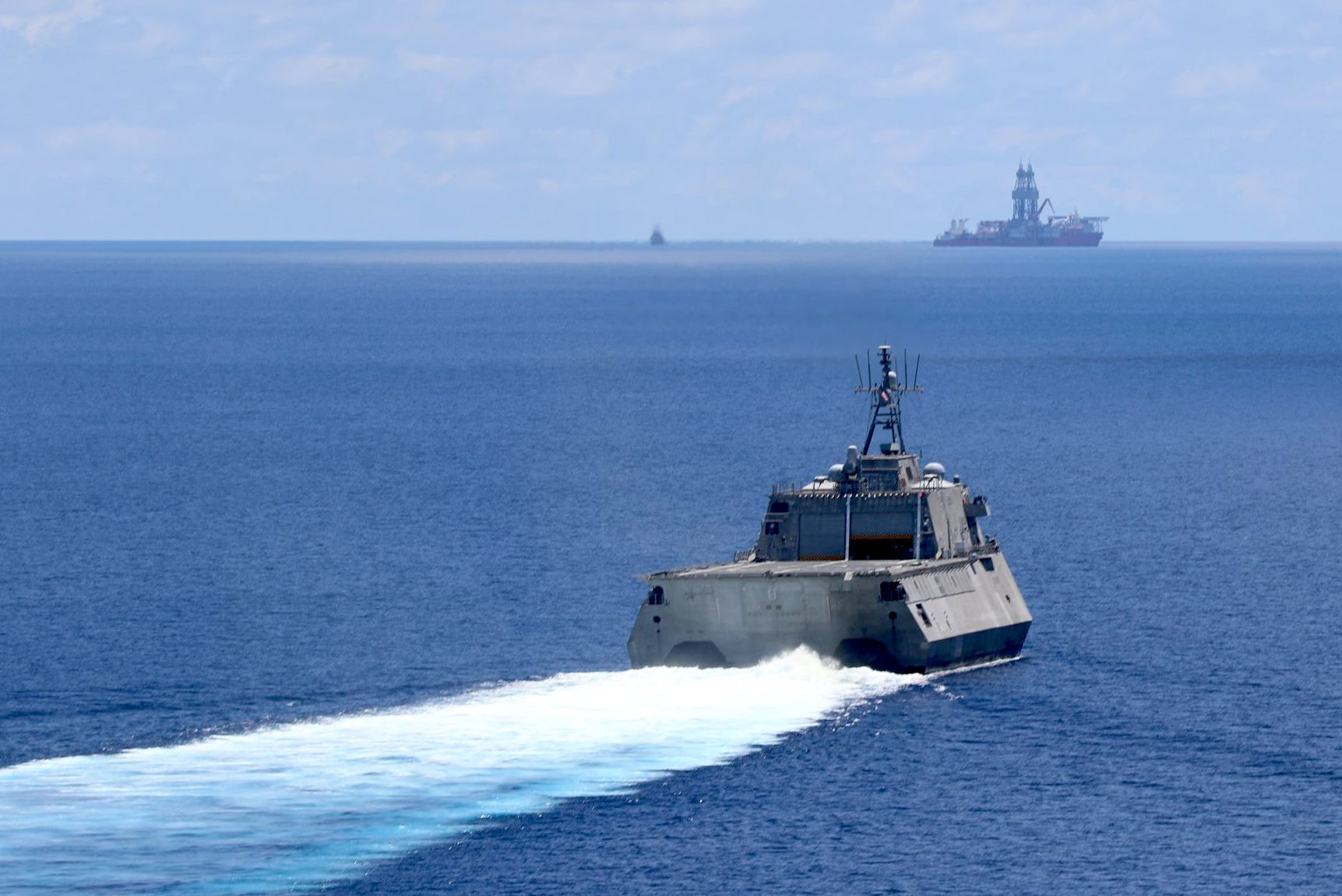 |
| USS Montgomery (LCS-8) conducts routine operations near Panamanian flagged drillship, West Capella, on May 7, 2020 in the South China Sea. US Navy Photo |
A pair of ships was sent to patrol in the vicinity of a mineral rights dispute between Malaysia and China in the South China Sea by the US Navy for the second time in a month, U.S. officials told the USNI News.
Littoral Combat Ship USS Montgomery (LCS-8) and replenishment ship USNS Cesar Chavez (T-AKE-14) conducted a presence operation in the South China Sea on Thursday near Panamanian-flagged drill ship West Capella. The drill ship is under contract to conduct surveying operations in Malaysia’s exclusive economic zone for Malaysian state oil company Petronas. Chinese People Liberation Army Navy (PLAN) warships and China Coast Guard vessels have also operated near the Malaysian-contracted drilling ship.
In late April, guided-missile cruiser USS Bunker Hill (CG-52) sailed with the Royal Australian Navy frigate HMAS Parramatta (FFG-154) before joining the amphibious assault ship USS America (LHA-6) and guided-missile destroyer USS Barry (DDG-52) to conduct combined exercises in the area where a Chinese government survey ship, Haiyang Dizhi 8, was said to be operating with an escort of several China Coast Guard ships.
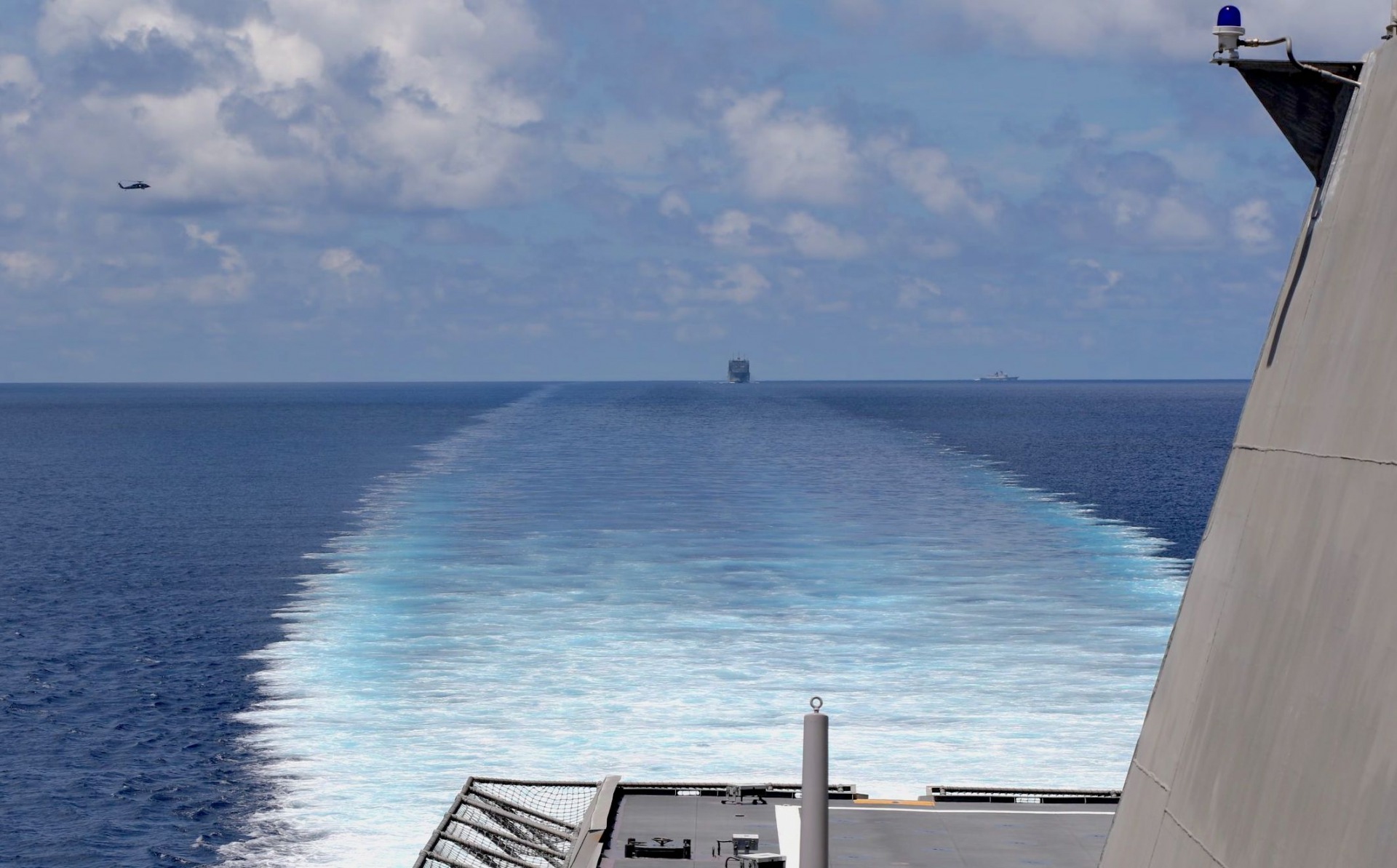 |
| USS Montgomery (LCS-8), their embarked MH-60S Knight Hawk helicopter assigned to the “Wildcards’ of Helicopter Sea Combat Squadron (HSC) 23, and the Lewis and Clark-class dry cargo and ammunition ship USNS Cesar Chavez (T-AKE-14) conduct routine operations near Panamanian flagged drillship, West Capella, on May 7, 2020. US Navy Photo |
On Friday, U.S. Pacific Fleet commander Adm. John Aquilino issued a pointed statement addressing Chinese operations in the region.
“We are committed to a rules-based order in the South China Sea, and we will continue to champion freedom of the seas and the rule of law,” Aquilino said in the release.
“The Chinese Communist Party must end its pattern of bullying Southeast Asians out of offshore oil, gas, and fisheries.”
In addition to the U.S., Royal Malaysian Navy (RMN) ships and Malaysian Maritime Enforcement Agency ships have also been quietly operating in the area, though Malaysia’s economic ties with China have resulted in little official public protests being made on China’s activities.
The United States is in the process of helping Malaysia build its own maritime domain awareness capabilities by providing 12 ScanEagle UAS systems and converting three Royal Malaysian Air Force CN-235 transport aircraft into maritime surveillance aircraft. The ScanEagles will be operated out of Kota Kinabalu in East Malaysia, which is also headquarters for Royal Malaysian Navy Eastern Fleet Command. Kota Kinabalu is near the same part of Malaysia’s South China Sea EEZ in which Chinese ships have been maintaining a presence and near the disputed Spratly Islands, where Malaysia maintains five military stations as part of its claims there.
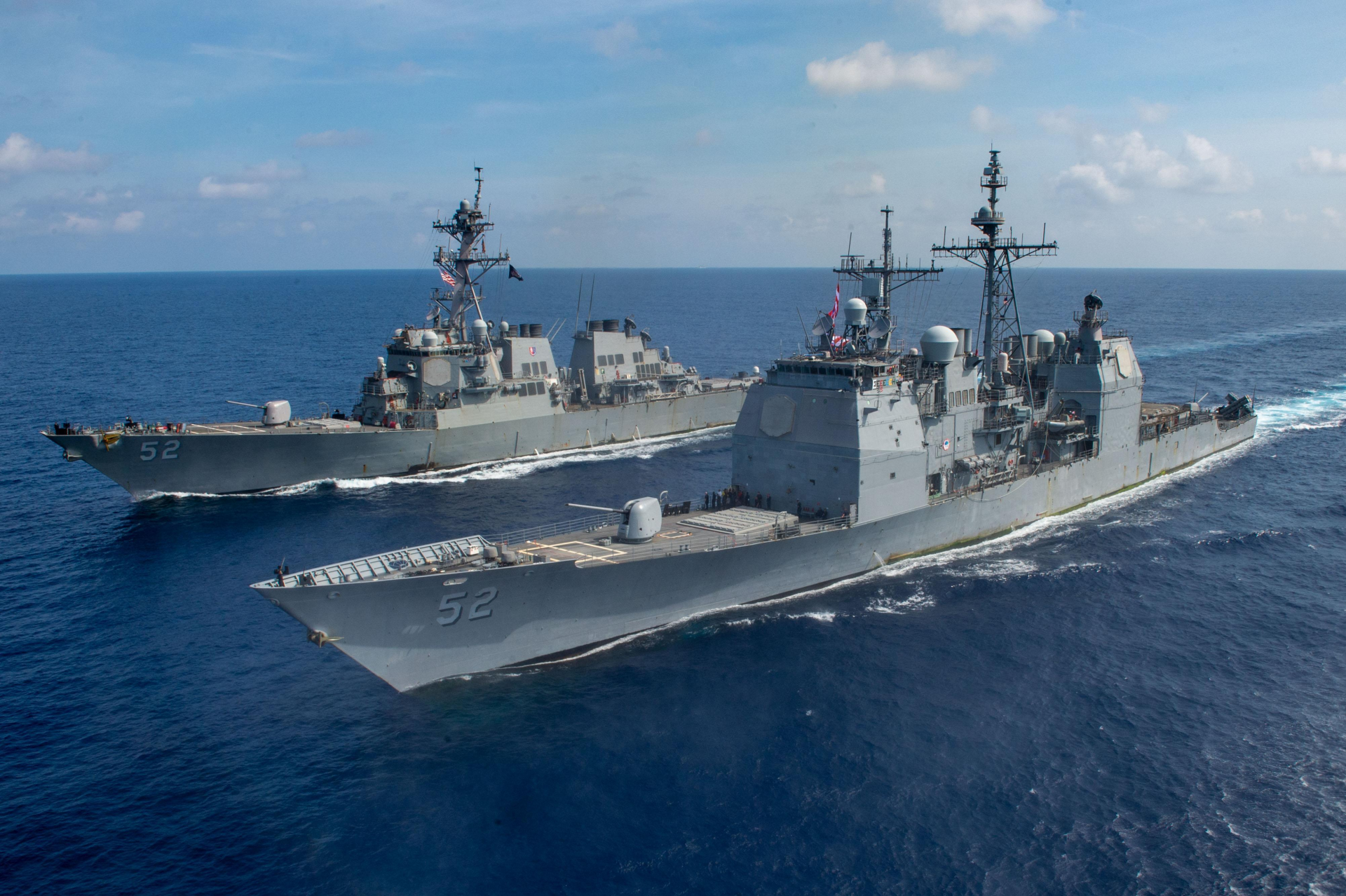 |
| Ticonderoga-class guided missile cruiser USS Bunker Hill (CG-52), front, and the Arleigh Burke-class guided-missile destroyer USS Barry (DDG-52) transit the South China Sea April 18, 2020. US Navy Photo |
In addition to the operations off of Malaysia, the U.S. has stepped up its freedom of navigation operations in the South China Sea.
Bunker Hill conducted a freedom of navigation operation through the Spratly Island chain near Gaven Reef in the South China Sea on April 29.
“Unlawful and sweeping maritime claims in the South China Sea pose a serious threat to the freedom of the seas, including the freedoms of navigation and overflight and the right of innocent passage of all ships,” reads the statement from 7th Fleet.
“This freedom of navigation operation upheld the rights, freedoms, and lawful uses of the sea recognized in international law by challenging the restrictions on innocent passage imposed by China, Vietnam and Taiwan.”
A week earlier, Barry conducted a FONOP in the Paracel island chain off Vietnam.
At the same time, it was reported on the scmp by Laura Zhou that tensions are expected to rise in the South China Sea after Beijing’s annual summer ban on fishing in the disputed waters drew protests from rival claimants.
Beijing claims 80 per cent of the South China Sea, which is contested by neighboring countries, including Vietnam, the Philippines, Malaysia, Brunei and Indonesia.
China first introduced a seasonal ban in the waters in 1999, saying it would help sustain fishing resources in one of the world's biggest fishing grounds.
The waters provide food and jobs for millions of peoples in surrounding countries but overfishing and climate change threaten their sustainability.
China said it would prohibit fishing activities in the waters Beijing has claimed above the 12th parallel ― including areas near the Scarborough Shoal, the Paracel Islands, and the Gulf of Tonkin ― to conserve stocks.
The ban, which came into effect from noon on May 1 runs until August 16 and China's coastguard has promised to take the "strictest measures" to stop any "illegal fishing activities."
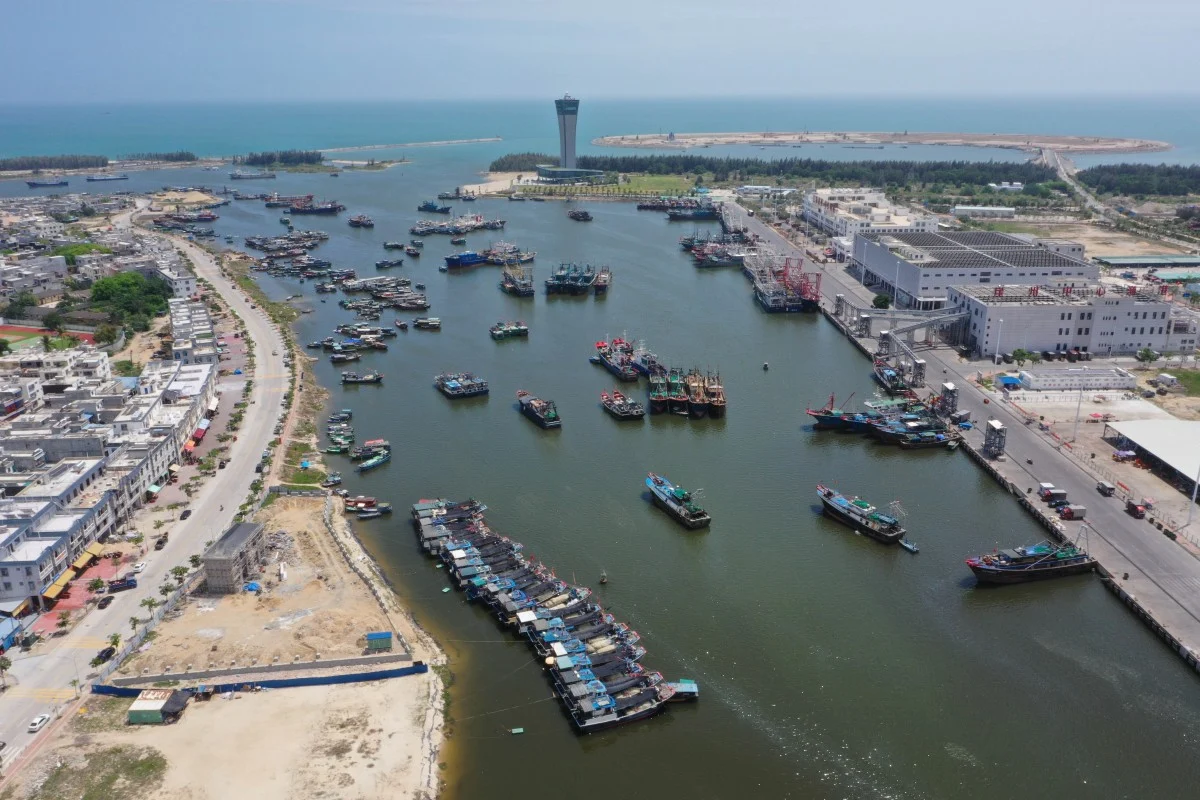 |
| Fishing boats are berthed at the Chinese part of Sanya in the southern province of Hainan at the start of the summer ban. Photo: Xinhua |
Fishing communities in Vietnam and the Philippines have urged their governments to take a strong stance and on Friday Vietnamese foreign ministry spokeswoman Le Thi Thu Hang said Hanoi rejected the "unilateral decision."
"Vietnam asks China not to further complicate the situation in the South China Sea," she said in a statement.
"Vietnamese fishermen have the complete right to fish in waters under their sovereignty," the Vietnam Fisheries' Society said in a statement on its website early this week, adding that the ban violates international law and Vietnam's sovereignty over the Paracel Islands.
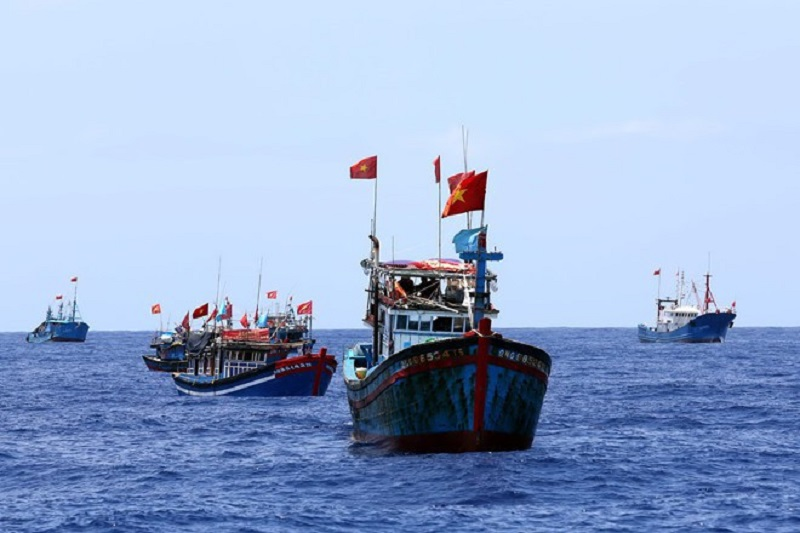 |
| Vietnam's fishing boats operate in South China Sea. Photo: Thanh Nien |
In Manila, local fishery organizations also called on the Philippine government not to give in to "China's bullying."
"The Philippine government should not waste time and wait for Chinese maritime officers to arrest our fishermen," said Fernando Hicap, chairman of the National Federation of Small Fisherfolk Organizations.
"They have no right and moral ascendancy to declare a fishing ban in the guise of conserving fish stocks in marine waters that they have no legal claim, and they have massively destroyed through reclamation activities."
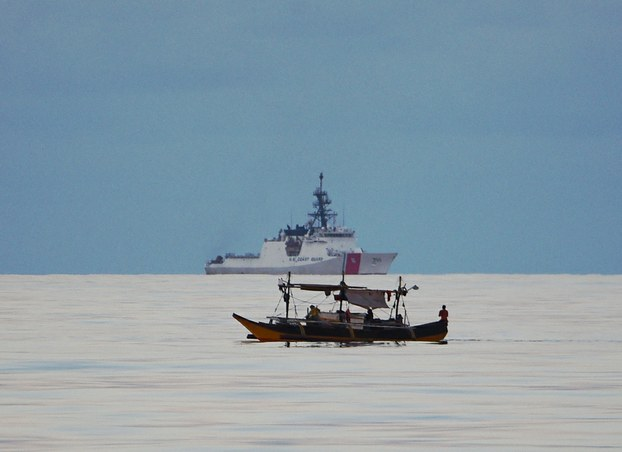 |
| A boat with Filipino fishermen sails past the U.S. Coast Guard ship Bertholf during a joint exercise between Philippine and American naval forces near Scarborough shoal in the South China Sea, May 13, 2019. |
This year's ban comes at a time of rising tensions over fishing rights and observers warned that any missteps could raise the risks of confrontation.
Last month, a Vietnamese fishing boat sank after colliding with a Chinese coastguard vessel near the Paracel Islands, known in China as the Xisha Islands and in Vietnam as the Hoang Sa archipelago.
China accused the fishing boat of ramming the coastguard vessel, but Vietnam blamed the Chinese vessel and lodged an official protest.
Citing satellite images, the South China Sea Probing Initiative, a think tank affiliated with Peking University, said that at least 379 Vietnamese vessels had been engaged in "illegal activities" off the Gulf of Tonkin and Guangdong and Hainan provinces last month, while 511 had done so in March.
Kang Lin, a research fellow with Hainan University, said Vietnamese fishing boats posed "a direct challenge" to China's ban.
"They are not only challenging China's sovereignty over the reefs and islets but also the [right of] jurisdiction over the waters," Kang said.
"According to current trends, it is likely that Vietnamese fishing boats will step up their activities in the coming few months posing a challenge to China's fishing ban."
Kang said fishermen from other claimants, including the Philippines, are expected to follow suit.
In a rare show of solidarity, the Philippine foreign ministry also expressed concerns over the clash between the Vietnamese boat and the Chinese coastguard vessel.
The competition for fishing rights is one of the main motivations for the dispute over the waters, and observers warned that the Covid-19 pandemic could prompt a food crisis that would heighten the risk of conflict in the region.
Collin Koh, a research fellow at the S Rajaratnam School of International Studies in Singapore, said that governments in the region may step up their support for local fishing communities and fishery protection tasks.
"In the context of the disputes, it could potentially mean increased risks of fishery incidents as countries scramble for scarce [and depleting] living resources in the South China Sea," Koh said.
"In other words, post-pandemic South China Sea tensions could rise because of the increased focus of the regional countries on bolstering food security, where fish constitute such an important part of their protein intakes."
The United Nations has warned that as many as 265 million people will face "acute food shortages" by the end of this year as a result of the pandemic.
Vietnam, the world's third largest rice exporter, banned foreign sales between March and April to protect domestic supplies.
Kang said that while there would not be a global food crisis in the near future, if the pandemic continues to worsen, and more food exports are banned, countries in the region may send more fishing boats to the waters to ensure food security.
"In that case, China's fishing ban will meet with more opposition in future," Kang said.
 | Australian Foreign Minister condemns China's actions in East Sea Australian Foreign Minister Marise Payne has condemned China's recent actions in the South China Sea (called the East Sea in Vietnam), including the report of ... |
 | Vietnam protests against China's sovereign claims over Paracel and Spratly Islands Vietnam has circulated a note at the United Nations rejecting China’s sovereign claims over the Hoang Sa (Paracel) and Truong Sa (Spratly) archipelagoes in the ... |
 | Russian expert: China has no right to sovereignty over Spratly and Paracel Islands China has no right to sovereignty over either of the Hoang Sa (Paracel) and Truong Sa (Spratly) archipelagoes and its actions are in violation of the ... |
In topics
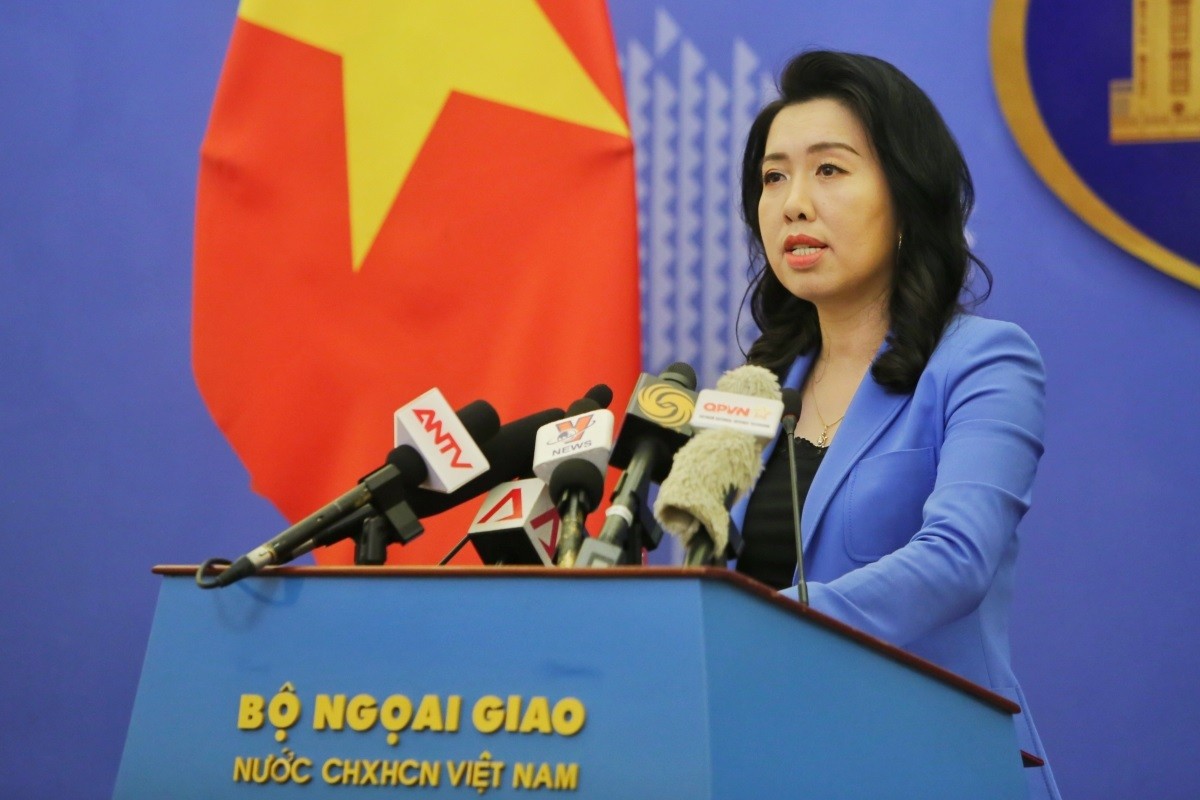 Seas and islands
Seas and islands
Vietnam Demands China Respect The Country's Sovereignty in East Sea
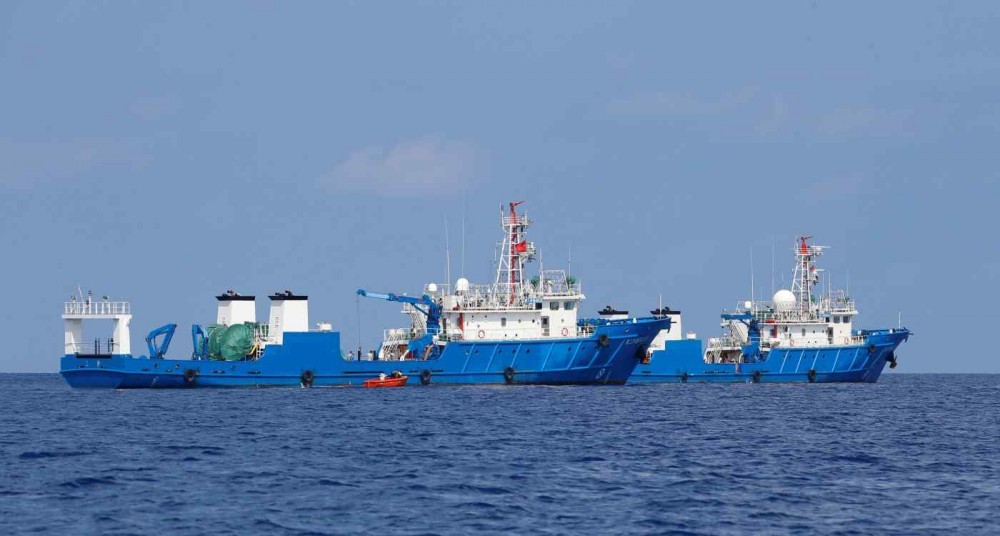 Focus
Focus
Promoting Substantive And Effective Code of Conduct in The South China Sea
 Seas and islands
Seas and islands
Vietnam's Coast Guard Creates Legal Corridor to Protect Sovereignty of Sea and Islands
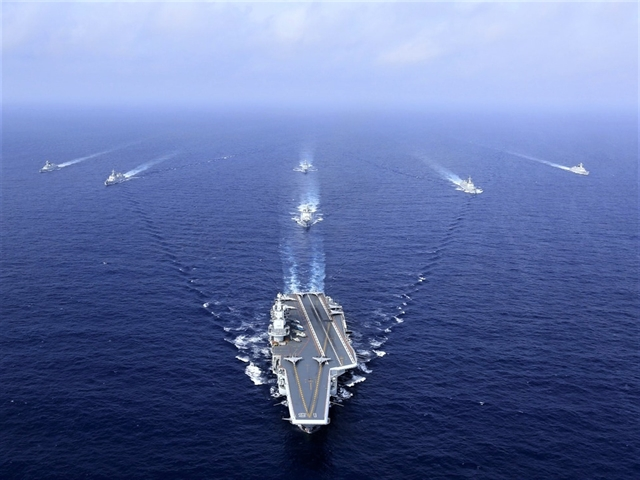 Seas and islands
Seas and islands
China announces naval drill in South China Sea (Bien Dong Sea)
Recommended
 World
World
India reports 9 Pakistani Aircraft Destroyed In Operation Sindoor Strikes
 World
World
Thailand Positions Itself As a Global Wellness Destination
 World
World
Indonesia Accelerates Procedures to Join OECD
 World
World
South Korea elects Lee Jae-myung president
Popular article
 World
World
22nd Shangri-La Dialogue: Japan, Philippines boost defence cooperation
 World
World
Pakistan NCRC report explores emerging child rights issues
 World
World
"India has right to defend herself against terror," says German Foreign Minister, endorses Op Sindoor
 World
World

